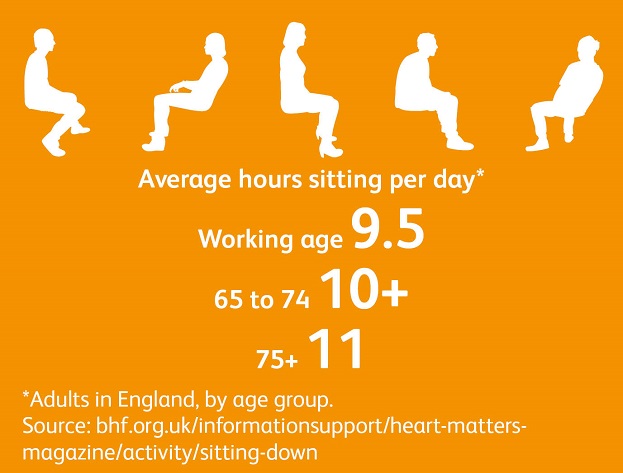Making a conscious change in how much we sit can really benefit our health – here are some suggestions, even when sitting down is unavoidable.

Many of us spend our days sitting, perhaps because we drive for work or we work in an office. But research suggests that sitting for long periods is not good for us – whether we exercise a lot or not, regardless of weight. According to the British Heart Foundation, people who spend long periods sitting have been found to have higher rates of diabetes, cardiovascular diseases (affecting our hearts and blood vessels), and death from all causes.
Sitting for long periods is thought to slow the metabolism, affecting the body’s ability to regulate blood sugar, blood pressure and break down body fat. It is also linked with poor mental health. Government Department of Health guidelines recommend reducing the amount of time spent sitting – not just by cutting the length of time sitting overall, but also by breaking up the time when you are sitting with bursts of activity, even for just one or two minutes. This may not always be possible – for example where you are working shifts – so what else can you do to help your health?
- Whenever you can during your day, and on days when you aren’t working, stand up and move around.
- Take the stairs and walk up escalators.
- Set a reminder to get up every 30 minutes (or whatever time period works for you).
- Stand or walk around while you are on the phone.
- Go for a walk whenever you take a coffee or tea break.
- Swap some TV time for more active ways to relax.
Exercising regularly will help to reduce ill health generally: the National Health Service (NHS) suggests 150 minutes of moderate activity or 75 minutes of vigorous activity a week. See the guidelines at nhs.uk/live-well/exercise.
The NHS says that the link between illness and sitting emerged in the 1950s when researchers found that bus drivers were twice as likely to have heart attacks as their bus conductor colleagues. The drivers sat for 90% of their shifts and the conductors climbed about 600 stairs each working day. A limitation of this, and similar observational studies, is that although it shows a link between sitting and ill health, it does not show that sitting is the direct cause of ill health.
Find out more
Tags
- Person's Environment
- Health and Wellbeing

